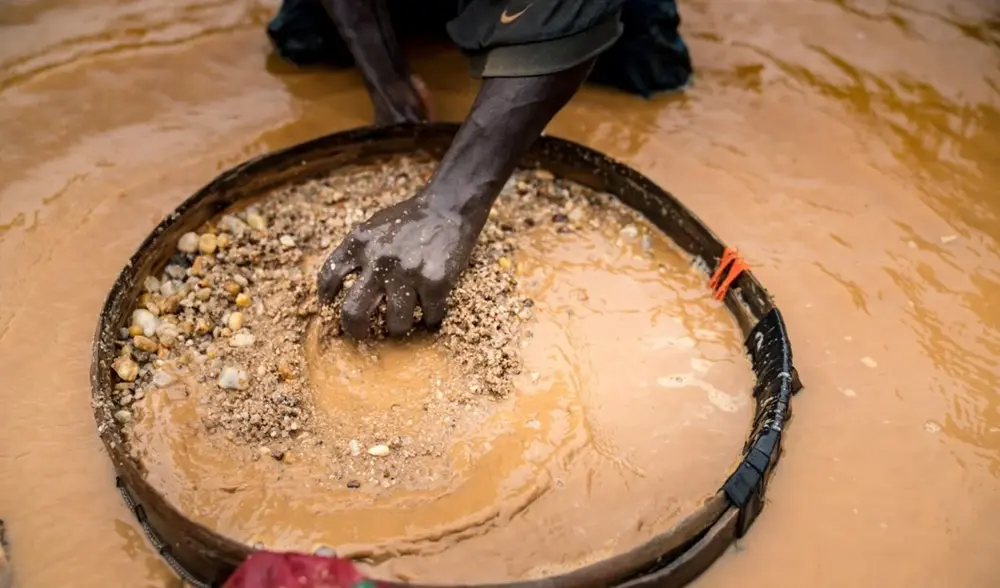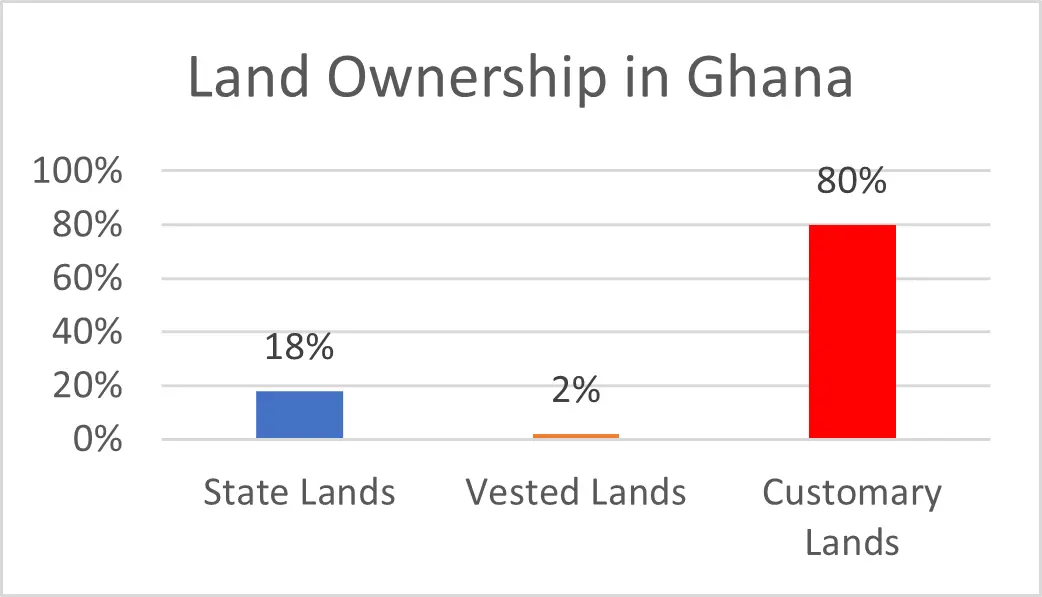Who owns the land? Formalizing the small-scale mining sector in Ghana: the role of property rights

Informal Artisanal and Small-scale Mining (ASM) is popularly known as `Galamsey` in Ghana. Like many resources endowed countries in the global south, there is an increasing expansion of the Artisanal and Small-scale Mining (ASM) sector in the country. ASM activities are traditional, small in scale, illegal and unregulated and are characterised by pollution of water bodies (streams and rivers), loss of vegetative covers and soils which create severe environmental outcomes. The health effects are also enormous including human exposure to cyanide and mercury; the chemicals used to obtain gold from gold-containing materials such as stones and rocks. The conventional procedures used by these miners, which up until now have offered various ecological services, mostly involves the excavation and washing of oxide materials in running streams. As a result, lateritic materials extensively silt up streams and rivers, which increases the risk of heavy metal leakage. This has resulted in the production of all these environmental concerns. However, ASM cannot be entirely halted given its critical economic importance to the different host countries since it has the second largest potential of creating jobs after agriculture but continues to face enormous challenges (Mcquilken and Perks, 2021). It is worth noting that, the severe impacts of ASM have necessitated a constant assessment and analysis to obtain a clearer understanding of the issue in attempts to its mitigation. The most critical step is therefore to formalise the sector and regulate activities of miners to achieve the state of sustainable mining. In fact, most of the environmental, health and safety issues in ASM can be resolved if ASM formalization is effective. Among other factors leading to the difficulties in formalising the sector, one of the greatest, if not the greatest is the issue of land tenure.
The state of ASM in Ghana
Ghana, previously known as Gold Coast, is heavily endowed with gold. Historical trends suggest that the practice of ASM activities in Ghana dates back to over 2000 years (Hilson, 2016). Ghana is currently the leading producer of gold in Africa with the total gold production of 4.8 million ounces in 2018 (Whitehouse, 2019) and the mining sector contributes to about 5% to Ghana’s GDP and minerals, accounting for 40% of total exports revenue. Gold constitutes up to 95% of total mineral exports and rakes in some 45% of Ghana’s total foreign currency (Wan, 2014). While Ghana´s mining policy prioritises large-scale gold mining, the conventional small-scale mining has progressively become a significant source of livelihood to many, essentially in rural Ghana. The sector directly employs more than 1 million people directly with the extractive and processing industries employ more that 60% of Ghana´s mining workforce (McQuilken and Hilson, 2016).
The Issue of Land tenure in ASM formalisation
In many sub-Saharan Africa countries, the parallel system of land ownership and resource governance exist. This is where there is a mixture of statutory and customary land governance systems in relation to ASM sector formalization of which Ghana is not an exception. With respect to mining, customary landowners, in this case chiefs and traditional leaders can exercise tenurial prerogative powers to increase the activities of illegal mining. This reality makes it difficult for states to implement regulation mechanisms to control the expansion of informal mining activities and to formalise the sector.
However, in rural areas where ASM is mostly carried out in Africa, communal or individual agricultural lands are mostly converted into ASM activities. The lands are therefore customary lands which are owned by indigenous people of the communities and are administered in accordance with customs. According to Bugri and Yeboah (2017), ASM communities on customary lands have caused fierce and violent contestations and have consequently hindered formalisation of the sector. This means that when there is clarity in property rights, resource conflicts can be drastically reduced and there will be potentials for statutory interventions to formalise the sector and reduce the negative impacts it has.
It is clear that efforts to formalise the sector has mostly focused on legalisation without focusing on a range of underlying contextual norms and practices, such as land tenure. This can lead to failure. When ASM is formalised, licenses will be issued to operators, records will be kept by mandated state institutions and their activities will be monitored to address environmental and socio-economic negativities. With the difficulties in formalising the sector in sub-Saharan Africa, several studies have indicated the massive role that land property rights play. There is mostly a conflict between statutory land rights and customary land rights in developing countries and informs the extent of formalising the sector through state interventions.

The way forward
1. Enhance collaboration from state and traditional institutions
The co-management of state and traditional institutions have made a significant change in managing and formalising the sector in a country like Cote d´Ivoire from which lessons can be drawn. Although this recommendation exists in regulatory frameworks for mining in Ghana, it is not operational in practice due to inadequate cooperation of traditional institutions. Participatory policy making is critical in formalising the ASM sector and the government of Ghana should consider the enhancement of collaborative mechanisms between customary and government institutions to make positive impact in controlling informal mining. Minerals Commission and the Forestry Commission should be well-resourced to carry out their mandate and deal with illegal miners.
2. Scale-up stakeholder consultations and build capacity of informal miners
Rather than greater stakeholder engagement, the government’s response to illegal mining has traditionally involved criminality and combative strategies like intermittent ad hoc military sweeps and raids on illegal local mines. This approach has largely failed over the years to deliver a lasting solution to the illegal mining ‘crises’ in Ghana (Hilson, 2016). The government, through the Ministry of Land and Natural Resources, should involve the Minerals Commission (MINCOM), consult stakeholders and properly plan future programmes that aim to deal with illegal mining. For example, the government should engage all relevant stakeholders including chiefs, local authorities, opinion leaders and community members before the formulation and implementation of any programme aimed at fighting illegal mining. It is important to note that when Chiefs and district assemblies are involved in initiatives aimed at fighting illegal mining, there will be a more local commitment to the fight. Finally, MINCOM should build the capacity of miners and operators in the informal sector on institutions and legal requirements governing the subsector and sustainable mining prior to granting mining licenses.
3. Improve Land Registration and Monitoring Systems
All lands must be registered. Implementing efficient and transparent land registration systems where the cumbersome nature of land registration is eased can help clarify land ownership. This reduces disputes over land and makes it harder for illegal mining to occur unnoticed. Also, institutions should make use of recent technologies such as drones and Geographical Information Systems to capture resource endowed lands and monitor every operation that takes place.
Conclusion
There has been some strides in institutional, policy and regulatory framework to formalize and regularize small-scale mining in Ghana. Essentially, policies have looked into easing cumbersome processes towards licenses and permits which has been the call of many. However due to the dominant customary land ownership system, the state still struggles to operationalise documented policies and frameworks. Ghana should learn from other mineral-endowed countries with similar ownership systems in sub-Saharan countries to make a significant impact. Collaboration between the state and traditional institutions (who own the land) should be strategically enhanced. Related, there should be intensive stakeholder consultations and capacity building for informal miners. Finally, there is the need to improve land registration mechanisms which will eventually improve monitoring of land-related activities such as illegal mining.
References
Bugri, J. T., & Yeboah, E. (2017). “A Brief Overview of Land Tenure Arrangements in Ghana.” Understanding Changing Land Access and Use by the Rural Poor in Ghana, International Institute for Environment and Development, 18-20
Hilson, G. (2016). Farming, small-scale mining and rural livelihoods in Sub-Saharan Africa: A critical overview. The Extractive Industries and Society, 3(2), 547–563. https://doi.org/10.1016/J.EXIS.2016.02.003
Mcquilken, J. T., & Perks, R. B. (2021). 2020 State of the Artisanal and Small-Scale Mining Sector (English). World Bank. www.delvedatabase.org/2020report
Wan, P. M. J. (2014). Environmental justices and injustices of large-scale gold mining in Ghana: A study of three communities near Obuasi. The Extractive Industries and Society, 1(1), 38–47. https://doi.org/10.1016/J.EXIS.2013.12.001
Whitehouse, D. (8th October 2019). Ghana now Africa’s largest gold producer, but reforms await. The Africa Report. Retrieved 28th January 2024, from https://www.theafricareport.com/18245/ghana-now-africas-largest-gold-producer-but-reforms-await/
About the Author

Justice Duah Agyemang is a current second year student at the Willy Brandt School of Public Policy. He holds a degree in Development Planning from the Kwame Nkrumah University of Science and Technology (KNUST) in Ghana. His interests are in urban, health and environmental policy development.
~ The views represented in this blog post do not necessarily represent those of the Brandt School. ~